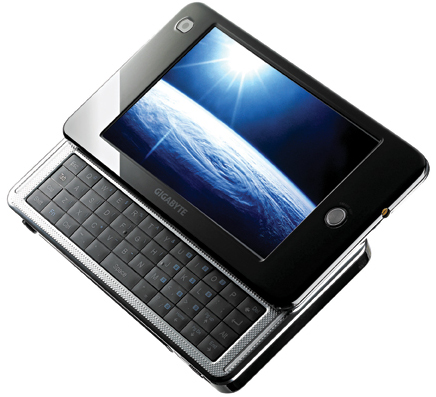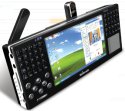First Atom-based Linux MID ships for $700
Sep 30, 2008 — by Eric Brown — from the LinuxDevices Archive — 18 views Aigo has started shipping what appears to be the first mobile Internet device (MID) based on the Intel Atom. The Linux-based Aigo P8860D is based on a soon-to-ship “M528” MID from Gigabyte, and features an 800MHz Z500 Atom, 512MB RAM, and a 4.8-inch touchscreen.
Aigo has started shipping what appears to be the first mobile Internet device (MID) based on the Intel Atom. The Linux-based Aigo P8860D is based on a soon-to-ship “M528” MID from Gigabyte, and features an 800MHz Z500 Atom, 512MB RAM, and a 4.8-inch touchscreen.
(Click for larger view of the Aigo P8860D)
The new MID from Gigabyte and Aigo appears to be the first MID to ship that uses the Intel Atom. Gigabyte appears to have originally developed the device, but whereas the Japan-based "DFJ" store is shipping its Aigo device with a $700 pricetag, Gigabyte does not list a price, and says that its M528 is "coming soon."

Gigabyte M528
With their combination of low-power Atom processor and 4.8-inch screen, the P8860D and M528 seem to perfectly match Intel's definition of the platform that it dubbed "mobile Internet device" over a year ago. The term, however, has been broadened by many to define other similarly sized handhelds, including the Nokia N810 Internet Tablet.
The 6.0 x 3.1 x 0.9-inch device sold by Aigo and Gigabyte weighs a scant 10.6 ounces and offers 3.5 to 5.5 hours battery life, says Aigo. It features a 4GB solid state disk (SSD), 2GB of MicroSD storage, and two USB ports. Connectivity features include WiFi, Bluetooth, GPS, and a HSDPA cellular data modem mini-card module. Both units offer the slide-down QWERTY keyboard that appears on most of the MID prototypes that were unveiled earlier this year at the Intel Atom Z500 launch. The device also offers a 4.8-inch, 800 x 480 touchscreen.
The Aigo P8860D runs the Red Flag MIDinux distribution favored by Intel for the MID category. (The Gigabyte version may well offer the same distro, but the retail page says only that it offers "Linux with Merry-Go-Round i-CON interface.") MIDinux is based on 2.6.20 and later Linux kernels, while the versatile filesystem-aware GRUB bootloader handles the booting honors. Startup time is sped up by the known, limited peripheral set, as well as a "fast resume" technique said to save time compared with Linux's normal software suspend (SWSUSP) scheme.
Specifications listed for the Aigo P8860D and Gigabyte M528 are listed as follows (we've combined specs provided by Gigabyte and by the DFJ store):
- Processor — Atom Z500 Intel Menlow clocked at 800MHz; Poulsbo graphics
- Memory — 512 MB (DDR2) RAM
- Display — 4.8-inch WVGA 800 x 480) touchscreen
- Memory storage — 4GB SSD storage; 2GB TF (MicroSD) card
- USB — 2 x USB ports (one Host, one mini-USB Client)
- WiFi — 802.11b/g
- Bluetooth — 1 x Bluetooth 2.0 via USB I/F (supports A2DP)
- GPS — 1 x GPS RF switching connector
- Cellular — HSDPA mini-card module
- Camera — 3-megapixel autofocus camera; 300K pixel webcam
- Audio — 3.5mm earphone mic; earphone out; speaker
- Dimensions - 6.0 x 3.1 x 0.9 inches (152 x 80 x 21.9mm)
- Weight — 10.6 ounces (300 gr)
- Power — 3.7V 2700mAH battery; 3.5 to 5.5 hours battery life; AC adapter
- Software (Gigabyte M528) — browser, email, IM, OpenOffice, Media AP, Skype
- Operating system — Red Flag MIDinux (Linux)
 WiBrain i1 MID prototype (Click for details) |
WiBrain recently unveiled an Intel Atom-based "i1" MID (shown below, right) at the IFA 2008 show, that was said to feature built-in cellular networking based on HSDPA (high-speed downlink packet access). However, there was little information made available on the i1, and upon last check, the device was still not for sale.
Availability
The Aigo P8860 (Gigabyte M528) is available now from the DFJ Store for $700. The Gigabyte M528 is listed as "coming soon." More information may be found on the Aigo MID here, and more on the Gigabyte M528 should be here.
This article was originally published on LinuxDevices.com and has been donated to the open source community by QuinStreet Inc. Please visit LinuxToday.com for up-to-date news and articles about Linux and open source.